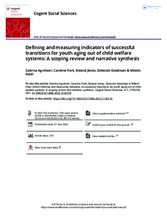Youth aging out of child welfare systems face an abrupt transition to adulthood and expectation for self-sufficiency with few supports. The current study represents a scoping review and narrative synthesis that sought to identify indicators used to measure the success of aging out youth and their corresponding methods of assessment. A database search was conducted and 150 articles were included in the review. Results revealed eight broad indicators of successful transitions, including: education, employment, basic needs, social support and relationships, conduct and victimization, health, general living skills, and resilience and psychological empowerment.
As a larger category, health was broken down into five subdomains of physical, mental health symptoms, reproductive/sexual health, substance use, and access to care/service utilization. Findings highlight the need for comprehensive tools and strengths-based approaches to assessing transitional gaps earlier in the aging out process. Given the interdependency of indicator outcomes, fulsome measurement can provide a window into a youth’s future concerns.

